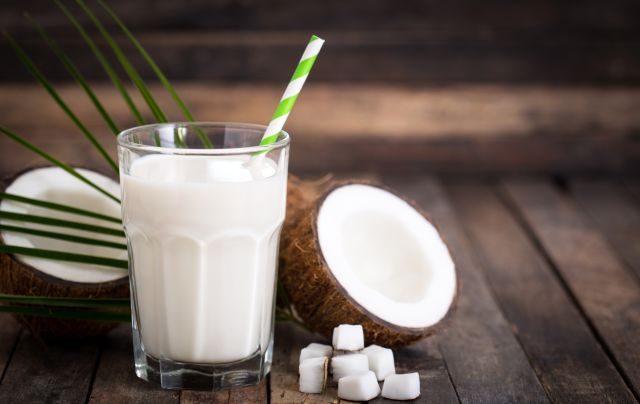Updated on January 20, 2023.
Coconut milk, one of the many alternatives to cow’s milk on the market, has been touted as a superfood and also condemned as an artery-clogging concoction. Which is correct? The answer is less than clear because research on coconut milk is relatively sparse. While it may offer some health benefits, if you choose to try it, it’s best to do so in moderation, as you would with any other health-food fad.
A nutty alternative
Coconut milk is made by simmering or soaking the white flesh from a coconut with water, then straining the mixture. It’s important to note that the coconut milk you might purchase in cartons in the refrigerated section at the supermarket is different from other coconut products out there. For one, it’s diluted with water and may contain certain preservatives, fillers, and stabilizers.
Coconut milk sold in cans tends to be a thicker, full-fat version of the product. The canned variety is often mixed into foods like Thai curries to lend creaminess, texture, and flavor. Coconut water, meanwhile, is the clear liquid found inside young, green coconuts and is often touted as an electrolyte-rich refreshing beverage.
Some people looking for a dairy alternative choose coconut milk over other non-dairy options because it is more milk-like than almond milk and doesn’t have the aftertaste of soy milk. Instead, coconut milk has a mild coconut flavor and a rich, smooth feel.
Depending on the brand, coconut milk can boast as much or even more calcium as cow's milk. Here's how an 8-ounce cup of unsweetened coconut milk from a leading brand stacks up to 2% cow's milk:
Unsweetened coconut milk:
- Calories: 40
- Total Fat: 4g
- Saturated Fat: 4g
- Cholesterol: 0mg
- Sodium: 45mg
- Potassium: 310mg
- Sugars: 0g
- Protein: 0g
- Calcium: 35% of recommended daily allowance (RDA)
- Vitamin D: 10% RDA
2% reduced-fat cow’s milk:
- Calories: 122
- Total Fat: 5g
- Saturated Fat: 3g
- Cholesterol: 20mg
- Sodium: 96mg
- Potassium: 390mg
- Sugars: 12g
- Protein: 8g
- Calcium: 29%* RDA
- Vitamin D: 19%* RDA
*Varies by brand
Coconut milk also contains phenolic compounds, molecules with antioxidant properties that protect against oxidative damage in the body. Oxidative stress causes inflammation in the body’s systems, increasing the risk of conditions like cancer, hypertension, and type 2 diabetes. Phenolic compounds work to inhibit inflammation and the damage it causes.
Good fat, bad fat?
The main drawback of coconut milk is its saturated fat content. The American Heart Association recommends limiting saturated fat to no more than 6 percent of your daily caloric intake. For a person on a 2,000-calorie diet, that means about 13 grams each day. A glass of coconut milk (the kind sold in cartons, not cans) has about a third of your daily max. (Canned coconut milk contains much higher amounts of saturated fat, as many as 11 grams per 1/3 cup serving.)
Saturated fat has a bad rep because it’s been shown to increase inflammation and to up the risk for conditions like type 2 diabetes, some cancers, and heart disease. Most health experts recommend limiting saturated fats of all sorts in your diet as much as possible.
That said, there is some science that shows that not all the saturated fat in coconut milk may be so bad for you. Part of the saturated fat in coconut milk is lauric acid, a medium-chain fatty acid (MCFA). Research has shown that MCFAs may be processed in the body differently than longer-chain fatty acids like palmitate (found in palm oil). According to the MCFA theory, lauric acid is more rapidly absorbed by the body and used for energy instead of clogging your arteries.
But there is not much research on how the MCFAs in coconut milk actually affect heart health. Most studies have looked at coconut oil, including a 2020 article in Circulation that found that consuming coconut oil—which has the same type of fat as coconut milk—increased LDL (aka “bad” cholesterol) by about 10 mg/dl and HDL (aka “good” cholesterol) by 4 mg/dl when compared with other types of vegetable oils. In a small study from 2013, people who ate coconut milk porridge for eight weeks saw their LDL levels decrease from 133.9 to 127.5 mg/dl, while their HDL increased from 43.1 to 52.2 mg/dl.
Raising HDL is one benefit of coconut oil—and in many parts of the world where it’s used regularly, like Asia, people tend to have good cardiovascular health. But many of these populations also don’t consume the large amounts of saturated fat from other products—such as meats and dairy—that people in the West tend to do. The Circulation authors still recommend avoiding the use of coconut oil.
How to try coconut milk
If you enjoy coconut milk’s silky texture and nutty flavor, or are new to the product and want to give it a try, there are no shortage of ways to use coconut milk. You can:
- Pour coconut milk on your morning cereal
- Replace dairy milk in baked goods
- Drink it as a beverage in place of cow’s milk
- Use it to make homemade nondairy frozen treats
- Try one of its many related products like yogurt, creamers, and ice cream
The canned variety has many uses, too. You can add it to curries and broths, or whip it to make a creamy topping for desserts.
Whether your pour coconut milk into your morning coffee or add it to a smoothie, be sure to watch your total saturated fat intake and stay within the recommended guidelines. If you have any history of high cholesterol or heart problems, check with a healthcare provider to make sure that adding coconut milk or other coconut products to your diet makes sense for your overall well-being.







